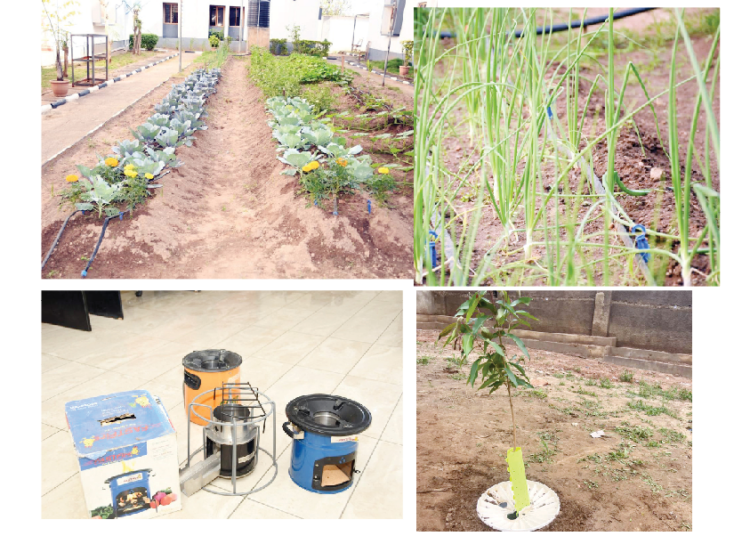Like all eleven frontline states, Sokoto faces the threat of drought, desertification, and other environmental challenges, which pose serious concerns for humans, animals, and the ecosystem at large.
According to the United Nations Convention to Combat Desertification (UNCCD), deforestation and desertification worldwide are critical challenges that lead to a loss in land productivity, poverty, and migration. Essentially, efforts to ensure the depth of groundwater most often hinder reforestation as saplings fail to grow a root structure long enough to reach water before they dry up and wither.
Owing to deforestation, Sokoto has endemic poverty and migration in search of the proverbial greener pasture. The initiatives from the National Agency for the Great Green Wall (NAGGW) are fundamentally helping the state change the narrative.
To address the environmental challenges which pose threats to both humans and animals, the NAGGW has taken different measures, including tree planting and economic empowerment for residents of some rural and worst-hit communities in Sokoto States.
One outstanding feature of NAGGW’s intervention efforts in Sokoto is the provision of shelter belts. Shelter belts are in the Goronyo, Gudu, Sabon Birnin, and Illela local government areas to improve soil fertility, serve as windbreaks to protect infrastructures, halt further land degradation, and improve the livelihoods of affected communities. There is also a woodlot situated at Rijiya donor, on the southern axis of the state, which would help reduce the rate of deforestation caused by the frequent cutting of trees for firewood.
The NAGGW is effectively using the Groasis Waterboxx, an inexpensive, easy-to-use device for planting trees. This is expected to help greatly renovate degraded land and fight desertification.
With the Waterboxx, the young saplings are protected from wind and sun by the walls and floor of the bucket. Once the saplings are strong enough, the tree incubator can be removed and reused. This new technology, as an advanced irrigation method, will significantly enhance the survival rate of seedlings and trees in Sahel and Sahara dryland areas.
The Waterboxx is an ecological water-saving technology that has proven effective in enhancing tree survival, increasing growth speed, and reducing the amount of water used to plant millions of trees.
The use of Groasis Waterboxx technology, an innovative solution to save dry ecosystems and reclaim deserts, was flagged off in the state by top government representatives led by the Secretary to the Government, Bello Sifawa.
His Eminence, Sa’ad Abubakar, the Sultan of Sokoto, represented by His Highness Alhaji Muhammad Jabbi Kilgore, had the opportunity to plant a tree within the sprawling palace’s premises.
Alhaji Bello Sifawa and Alhaji Jabbi Kilgori, after flagging off the programme respectively, made it clear that Sokoto State Government and the Sultanate are very much happy to be parts of the NAGGW programme’s beneficiary and also assured that adequate measures will be put in place to ensure that the plantation is fully protected.
Already, a perimeter fencing wall has been created to protect the plantation from stray animals or human destruction. Two members of the Sokoto Security Corps, on shift operation, are always on guard at the government house to prevent human encroachment into the plantation.
Ibrahim Mohammed, a member of the NAGGW’s Forest Guard manning one of the shelter belts’ walls, disclosed that “two of us were deployed here to run different shifts in ensuring that no one walks through this enclosed arena so that the plants could grow well.
“As patrol guards, we are to politely stop people from walking through the barricaded arena and ensure the gardeners trim the lawn when necessary.”
It is on record that NAGGW planted 2,000 hectares of economic trees across the state to reduce the effect of deforestation and climate change activities. The planting of economic trees at Sultan Bello Secondary School, Sokoto, stood out as part of the agency’s celebration of the 2024 Great Green Wall Day in Sokoto state.
This shows the agency’s commitment to promoting sustainable development and afforestation in the state and fostering long-term partnerships for environmental sustainability.
Fundamentally, the NAGGW’s impacts are also being felt in the area of economic empowerment. The agency believes that while there is a need to work towards environmental sustainability, there is an even greater need to ensure humans are economically empowered to enjoy a sustainable environment.
To this end, several women and youths in communities in Sayinna and Kware’s local government area of Sokoto state, in addition to being opportune to have orchard plantations established in their areas, also benefit from economic empowerment training in diverse areas. The NAGGW also provided irrigation facilities to green the plantation. Boreholes, drip irrigation, and tube wells with surface pump machines were provided.
For instance, farmers were also trained on best agricultural practices and empowered with farm tools and inputs like assorted/improved seeds to engage in farming activities that would generate income and improve livelihoods.
Haliru Bala, a vulcaniser turned tomato farmer, said, “The coming of NAGGW was really an eye-opener. “Before, I had been living from hand to mouth, maintaining my family with the meagre earnings from tyre repairs. Now, things have changed for the better for me and my family.
“As a beneficiary of NAGGW assorted/improved seedlings, I am now a big-time farmer of different species of pepper. The yield was bountiful and overwhelming for my immediate family, and I had to engage labourers during harvesting.”
Interestingly, the NAGGW has continued to positively impact lives in the state in different areas, one of which is the provision of water. To students/staff and residents living behind the Federal Science College, Sokoto, premises, the borehole constructed by NAGGW remains their saving grace and source of water for their domestic use.
The NAGGW also distributed Super Saver Wood Stoves, which help to significantly reduce carbon dioxide and other harmful gases while also ensuring environmentally friendly and efficient cooking solutions that reduce harmful emissions and promote better health outcomes.
This is a masterstroke to the traditional open cooking fireplace charcoal fires. It has the potential to help prevent respiratory diseases, improve health outcomes, and enhance the quality of life for millions
The technologically improved Super Saver Wood Stove combustion chamber reduces the quality of firewood needed for cooking, which, by extension, reduces the number of trees cut in the forest.
A beneficiary, Hajiya Muniratu Abubakar, told our correspondent that it helps save cost, time, and health because I inhale less smoke.
“Aside from the health benefits of emitting less smoke, the stove is durable and affordable to use, compared to the cost of a gas cylinder, refilling of gas or using a kerosene stove that cannot last more than a year.
“By adopting clean cooking solutions, communities can reduce air pollution, conserve forests, and contribute to the fight against climate change”, she noted.
Mallam Nasiru Sani, a father of seven, is one of the beneficiaries of NAGGW’s interventions in Sokoto. He said the agency has helped greatly in making life more meaningful for residents of most communities worst hit by the increasing and devastating impacts of desertification. ‘The plant trees provide boreholes, which we also use as a source of water for humans and animals. They are doing well for us,” he said.





